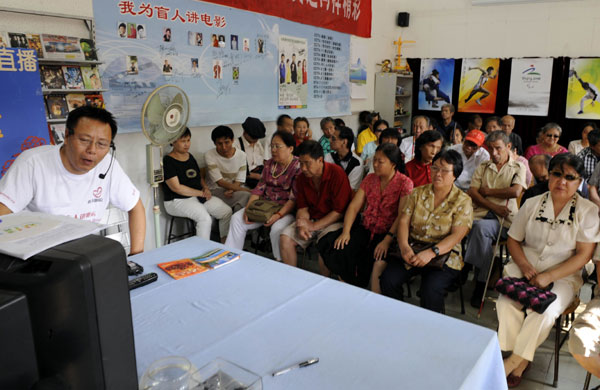Movies to accommodate deaf, blind
Updated: 2011-11-23 07:57
By Qiu Bo (China Daily)
|
|||||||||||

|
|
A worker at the Heart Cinema explains a movie to a group of blind people in a residential building in Beijing on Sept 5, 2008. Wu Jun / for China Daily |
BEIJING - Many film lovers might think it odd to hear a voice describing the action on a movie screen by saying things such as "the man wearing a leather hat is jumping up and down with excitement".
The words would not come as such a surprise, though, if those hearing them knew they were directed toward the blind.
The government has recently taken steps to increase the production of films that have special accommodations for those with visual and hearing impairments, said Liu Binjie, director of the General Administration of Press and Publication, on Tuesday.
"We aim to produce 10 to 20 films a year that are suitable for people who have these disabilities," he said at a news conference.
"A civilized nation and developed society should care for everybody, including the disabled."
At the conference, the administration gave about 10,000 sets of specially made digital-video discs to blind and deaf film lovers.
Since the start of the donation project in May, 23 popular films, including the box-office smash If You Are the One, have been introduced to people with visual and hearing impairments.
To give deaf viewers a more complete experience of movies, filmmakers have added sign language and subtitles to their works.
Accommodations are more difficult for the blind. To help them better know what is taking place on a movie screen, filmmakers have to use narrations that describe details such as the color of a character's dress, the expression on another character's face or the location of a scene.
"To finish dubbing descriptive narrations for a film, it usually takes our best expert at least a week," said Zeng Xin, who works at the Beijing Hongdandan Educational and Cultural Exchange Center, a civil organization.
The organization was established in 2003 and is aimed at helping the blind to more fully experience movies through the use of narration. In 2005, it opened a theater named Heart Cinema.
"A qualified narrator must know exactly what sort of details a blind person will want to know when a film is showing," she said.
Zeng said a narrator has to watch a film several times and conduct research before he can do his work properly. She said she supports the government's plan regarding the blind and the deaf.
"We'd like to share our experience with the administration," she said.
China is home to about 83 million disabled people. Of them, about 12 million have visual impairments and 20 million have hearing impairments, according to Wang Naikun, executive vice-president of China Disabled Persons' Federation.
"Like everyone else, people with disabilities want to learn about the world through films," Wang said.
At least one person welcomes the plan.
"This a precious gift to me and my friends," said Cui Yingchao, a primary school student at Beijing School For the Blind. "We're expecting to enjoy more films."
Hot Topics
HIV/AIDS, Egypt protest, Thanksgiving, climate change, global economic recovery, home prices, high-speed railways, school bus safety, Libya situation, Weekly photos
Editor's Picks

|

|

|

|

|

|







